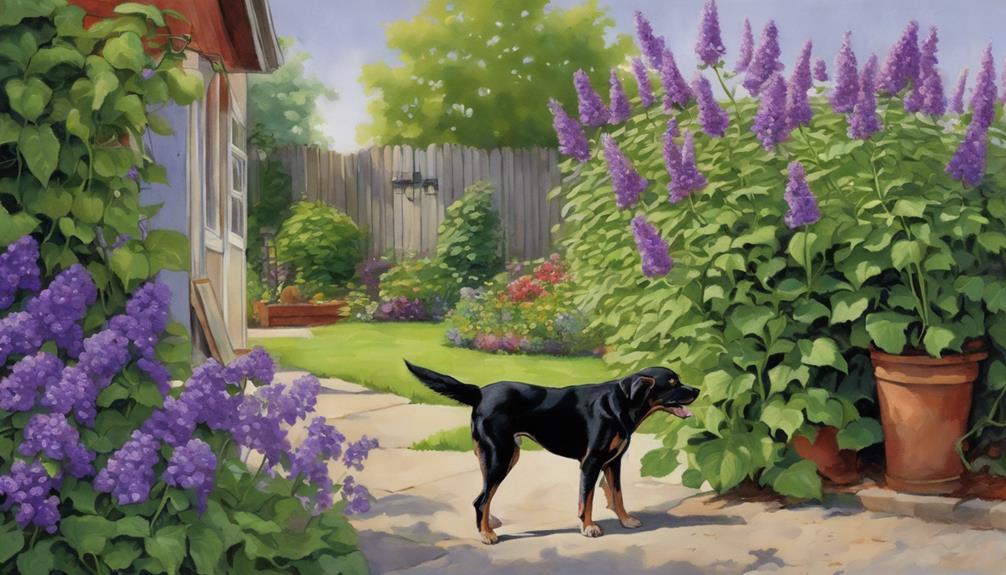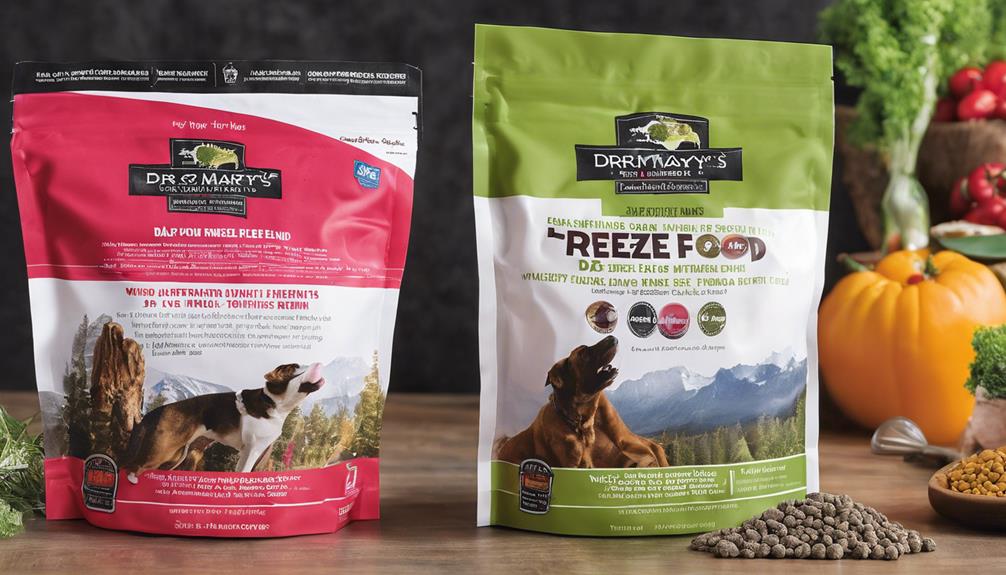Potato vine is harmful to dogs, causing symptoms like vomiting, diarrhea, abdominal pain, and lethargy. Immediate vet care is essential to prevent severe outcomes. Keep the plant away to avoid poisoning. Watching for symptoms like restlessness and dehydration is critical. Swift action can prevent organ damage and complications. Focus on early diagnosis and treatment if ingestion occurs. Elevate vines and supervise dogs outdoors. Factors like size and amount ingested affect severity. Take necessary steps to avoid accidental ingestion. Remember, knowing these details helps in recognizing seriousness and seeking quick help.
Key Takeaways
- All parts of sweet potato vine are toxic to dogs.
- Symptoms include vomiting, diarrhea, abdominal pain, and lethargy.
- Immediate veterinary care is crucial to prevent fatal outcomes.
- Severity varies based on consumption amount and dog size.
- Prevention by keeping vines out of reach is essential.
Toxicity of Potato Vine in Dogs
When dogs ingest the toxic sweet potato vine, they can experience symptoms such as vomiting, diarrhea, abdominal pain, and lethargy. It's important to be aware that all parts of the sweet potato vine, including the leaves, stems, and roots, are harmful to our furry friends.
If you suspect your dog has ingested any part of the sweet potato vine, immediate veterinary care is essential to prevent potentially fatal outcomes. The severity of sweet potato vine toxicity can vary depending on the amount consumed and the size of the dog.
Remember, prevention is key in keeping our canine companions safe from this toxic plant. By ensuring that sweet potato vines are out of reach and not accessible to your dog, you can help avoid these distressing symptoms and potential health risks.
Stay vigilant and prioritize your pup's well-being by being mindful of the dangers posed by this toxic plant.
Symptoms of Potato Vine Ingestion
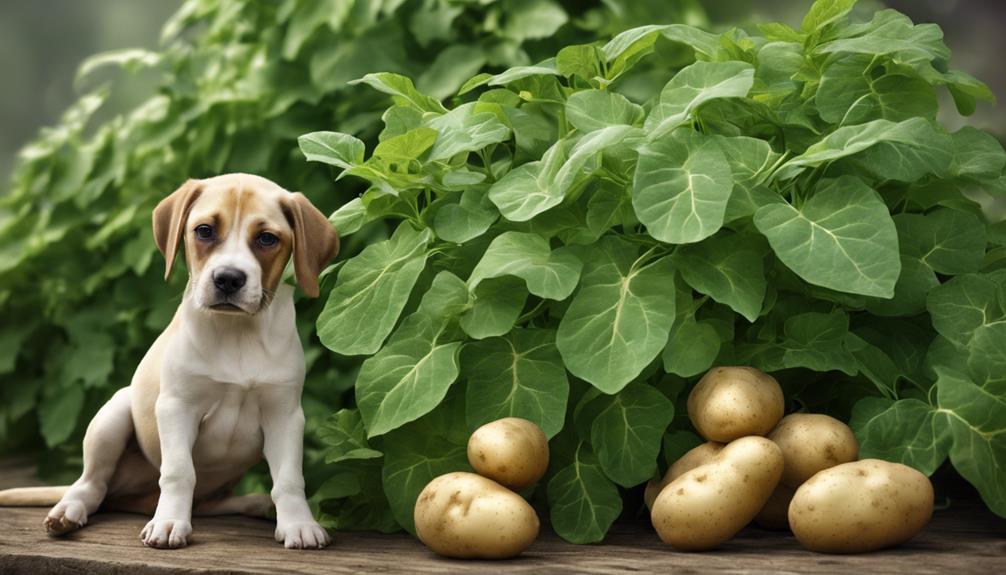
When a dog consumes potato vine, they may experience typical symptoms like vomiting and diarrhea. Seeking immediate veterinary attention is vital to avoid possible organ damage.
Monitoring for any signs of lethargy or weakness is paramount for the well-being of the dog.
Common Symptoms Observed
After consuming potato vine, dogs commonly exhibit symptoms such as vomiting, diarrhea, abdominal pain, and lethargy. These signs indicate potential poisoning from the potato plant.
If your dog has been ingesting sweet potato vine, be vigilant for these symptoms. Abdominal pain may manifest as discomfort or restlessness in your pet.
Vomiting and diarrhea can lead to dehydration and electrolyte imbalances, so it's important to monitor your dog closely. Lethargy, or unusual tiredness, is another common symptom that may indicate a problem.
If you notice these signs after your dog has had access to potato vine, it's essential to seek veterinary care promptly to address any potential poisoning and safeguard your pet's well-being.
Immediate Veterinary Attention
Seek urgent veterinary attention if your dog exhibits symptoms of potato vine consumption, such as vomiting, diarrhea, abdominal discomfort, and lethargy. These indicators suggest potential poisoning, necessitating prompt professional evaluation.
The seriousness of symptoms may vary depending on the quantity of potato vine consumed. Veterinary care is vital to address the toxicity and provide necessary care. Delayed intervention could result in complications or exacerbate the situation.
By acting promptly and seeking immediate assistance, you can safeguard the well-being of your furry companion. Remember, early intervention is essential in managing potato vine ingestion in dogs and can have a substantial impact on their recovery process.
Your veterinarian will be able to advise you on the appropriate steps to take for your pet's health.
Potential Organ Damage
Ingesting potato vine by dogs can potentially result in organ damage due to the presence of toxic compounds like solanine and chaconine. When a dog consumes potato vine, the toxic substances in the plant can harm their organs, leading to serious health issues.
Here are some symptoms of potential organ damage from potato vine ingestion in dogs:
- Gastrointestinal upset, including vomiting and diarrhea.
- Abdominal pain, which can cause discomfort and distress.
- Lethargy, where the dog may appear weak or lacking in energy.
If your dog shows any of these signs after ingesting potato vine, immediate veterinary care is crucial to prevent further complications and safeguard their well-being.
Diagnosis and Treatment for Dogs

Our approach to diagnosing and treating potato vine poisoning in dogs focuses on identifying symptoms promptly and providing necessary medical interventions. When a dog ingests plant material like the potato vine, it can exhibit symptoms such as vomiting, diarrhea, and lethargy, indicating potential poisoning. Seeking immediate veterinary care is vital in diagnosing and treating this condition to prevent further complications. Treatment may involve inducing vomiting to remove the toxin, administering IV fluids to maintain hydration, and providing oxygen therapy if needed. Decontamination therapy might also be used to reduce toxin absorption in the dog's system. Additionally, the veterinarian may prescribe medications like anti-seizure medication based on their assessment. Below is a table summarizing the diagnosis and treatment approach for potato vine poisoning in dogs:
| Diagnosis | Treatment |
|---|---|
| Identify symptoms promptly | Induce vomiting |
| Seek veterinary care immediately | Administer IV fluids |
| Monitor for potential complications | Provide oxygen therapy if necessary |
| Consider decontamination therapy | Prescribe medications based on vet's assessment |
Sweet Potato Vine Poisoning Prevention
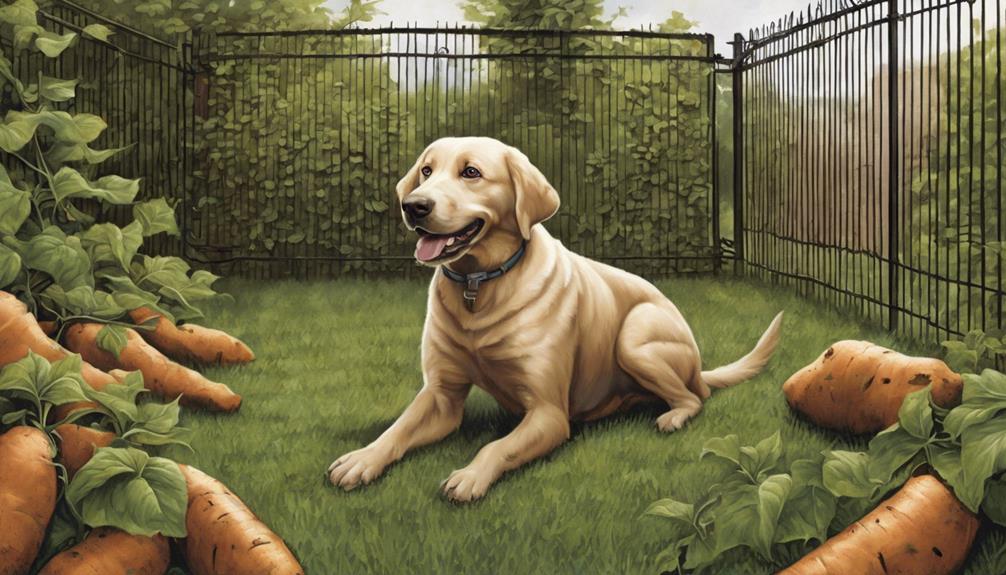
To safeguard your furry companions from the dangers of sweet potato vine poisoning, it's essential to be mindful of the plant's toxicity and take proactive measures to prevent access. Here are three key steps to keep pets safe:
- Elevate and Secure: Place sweet potato vines in hanging baskets or on high shelves where dogs can't reach them. Make sure outdoor vines are in fenced areas or inaccessible sections of your garden.
- Supervise Outdoors: When your dogs are outside, keep a close eye on them to prevent any unsupervised snacking on potentially harmful sweet potato vines. Quick intervention can avoid accidental ingestion.
- Consider Alternatives: Opt for pet-friendly plants like petunias, marigolds, or impatiens for your landscaping needs. These alternatives are safe for your furry friends and provide a beautiful touch to your outdoor spaces.
Factors Influencing Poisoning Severity
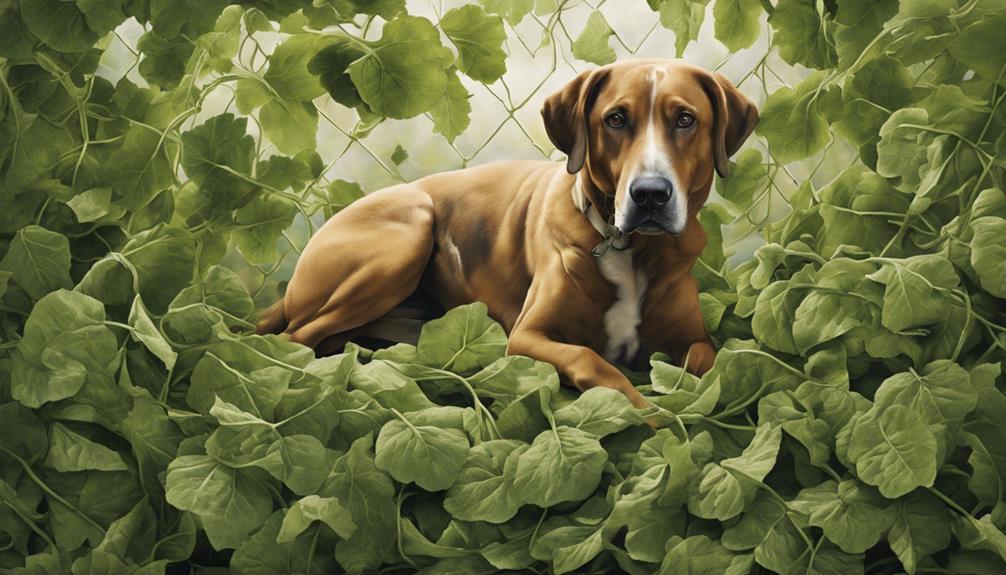
When it comes to potato vine poisoning in dogs, the severity of the situation can depend on a few key factors. These include the amount of the plant consumed and the size of the dog.
Smaller breeds, such as Chihuahuas, might be more vulnerable to experiencing severe symptoms.
Toxicity Levels
Factors that influence the severity of potato vine poisoning in dogs include the amount ingested, the specific parts of the vine consumed, and the individual dog's sensitivity.
When it comes to toxicity levels, it's important to take into account:
- Amount Ingested: The more potato vine a dog consumes, the higher the risk of poisoning.
- Specific Parts Eaten: Certain parts of the plant, like the leaves or stems, contain higher concentrations of toxins.
- Dog's Sensitivity: Each dog reacts differently to toxins, with smaller breeds often being more vulnerable.
Understanding these factors can help dog owners recognize the seriousness of potato vine ingestion and act promptly to seek veterinary assistance. Remember, quick action is key to minimizing harm to your furry friend.
Symptoms in Dogs
Monitoring for symptoms like vomiting, diarrhea, abdominal pain, and lethargy in dogs who have ingested potato vine is essential to assess the severity of poisoning. The intensity of these symptoms can vary depending on the amount consumed and the dog's size. Additionally, a dog's overall health and existing health conditions play a significant role in influencing how severe the poisoning symptoms may be. Immediate veterinary attention is crucial in cases of potato vine ingestion to prevent complications and provide appropriate care. If you notice any of these symptoms in your dog after potential exposure to potato vine, contacting your veterinarian promptly is vital. Seeking professional guidance can help prevent serious health issues or even fatal outcomes associated with potato vine poisoning in dogs.
| Symptom | Description | Severity Level |
|---|---|---|
| Vomiting | Expelling stomach contents forcefully | Moderate |
| Diarrhea | Loose or watery stools | Mild |
| Abdominal Pain | Discomfort or pain in the belly area | Severe |
Immediate Actions for Poisoning Cases
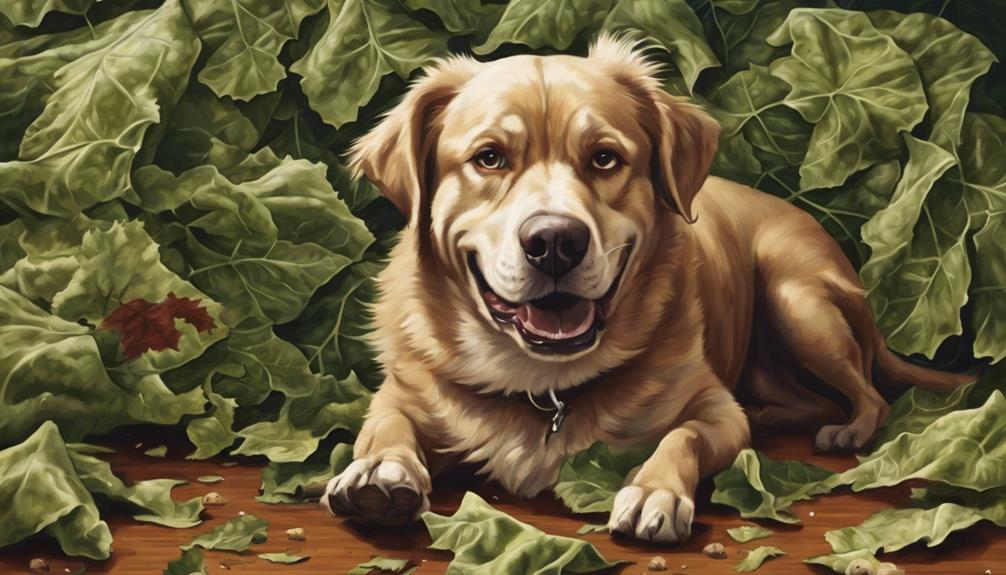
Taking immediate action in cases of potato vine poisoning in dogs involves inducing vomiting to eliminate toxins from the system. If you suspect your dog has ingested potato vine, here are some steps to follow:
- Inducing Vomiting: Administer hydrogen peroxide to help your dog vomit and expel the toxins from their system.
- Contacting a Veterinarian: Seek prompt guidance from a vet for further instructions and treatment to prevent complications.
- Monitoring for Symptoms: Keep a close eye on your dog for signs like vomiting, diarrhea, or lethargy after ingestion, and report any changes to the veterinarian.
Frequently Asked Questions
Are Potato Vines Harmful to Dogs?
Potato vines are harmful to dogs. Ingesting any part of the plant can lead to serious symptoms like vomiting, diarrhea, and abdominal pain. Immediate veterinary attention is critical if your dog consumes potato vines to prevent fatal poisoning.
Keep potato vines out of reach and supervise your dog outdoors to prevent accidental ingestion. Opt for pet-safe landscaping alternatives to guarantee your furry friend's safety.
What Happens if a Dog Eats a Potato Plant?
When a dog eats a potato plant, it can lead to toxicity due to harmful substances like solanine and chaconine. Symptoms may include upset stomach, drooling, and fatigue. Immediate vet care is essential to prevent serious complications.
Treatment might involve inducing vomiting, IV fluids, and supportive measures. Don't feed dogs any part of the potato plant, especially raw. Prioritize your pup's health by avoiding potential risks like potato plant poisoning.
Are Potato Vine Leaves Poisonous?
Potato vine leaves aren't poisonous to dogs. They can safely munch on these leaves without any harm. The minimal toxicity in potato vine leaves poses no danger to our furry friends.
Unlike the potato plant itself, which can be harmful, the leaves are completely safe for dogs to ingest. So, if your dog decides to snack on potato vine leaves, there's no need to worry – they'll be just fine!
Are Potato Bushes Safe for Dogs?
Yes, potato bushes are harmful to dogs. They contain substances like solanine and chaconine that can cause serious health issues if ingested. Symptoms of poisoning include vomiting, diarrhea, abdominal pain, and lethargy. Immediate veterinary care is vital if a dog consumes any part of the potato bush.
To keep our furry friends safe, it's important to prevent access to these toxic plants. Let's prioritize our dogs' well-being by being vigilant about potential hazards in our surroundings.
Conclusion
To sum up, it's important to remember that potato vine can be poisonous to dogs if ingested. To keep your furry friends safe, always be mindful of the plants in your yard and garden. If you suspect your dog has ingested potato vine, seek immediate veterinary help.
Prevention is key in keeping your pets healthy and happy. Remember, an ounce of prevention is worth a pound of cure. Stay informed and keep your pets safe from potential dangers.
